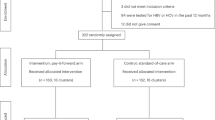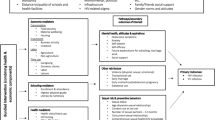Abstract
Focusing on parental communication is a promising way to extend the reach of HIV-related interventions and prevention programs to underserved adolescents and their families in the US. One highly relevant population in need of services is Black males who constitute more than one-third of all new HIV infection cases in the US. We sought to determine whether the family context (i.e., parent support, parent relationships) impacted HIV testing over time. For this study, we used the first and third waves of the Add Health restricted dataset from the National Longitudinal Study of Adolescent Health of Black males (average age 16.1 years). Descriptive statistics found that over 75% of the sample had never been tested for HIV/AIDS, while only 58% reported using a condom. Bivariate regression analysis followed by multinomial analysis was conducted to identify the factors that were associated with the likelihood of one-time or continued HIV/AIDS testing. Major study findings indicate that Black males, who reported positive parent support and/or had visited the doctor, were more likely to get tested for HIV/AIDS. Males who had parents or peers that possessed negative attitudes about sex were less likely to get tested for HIV. The findings of this study suggest several implications for prevention and intervention aimed at optimal ways to increase HIV testing among Black males warranting further investigation.
Similar content being viewed by others
References
Schnall R, Rojas M, Travers J. Understanding HIV testing behaviors of minority adolescents: a health behavior model analysis. J Assoc Nurses AIDS Care. 2015;26:246–58. https://doi.org/10.1016/j.jana.2014.08.005.
Centers for Disease Control and Prevention CDC (2016a) HIV among African Americans. U.S. Department of Health and Human Services. Retrieved from https://www.cdc.gov/nchhstp/newsroom/docs/factsheets/cdc-hiv-aa-508.pdf.
Kapungu CT, Baptiste D, Holmbeck G, McBride C, Robinson-Brown M, Sturdivant A, et al. Beyond the “birds and the bees”: gender differences in sex-related communication among urban African American adolescents. Fam Process. 2010;49(2):251–64.
Aspy CB, Vesely SK, Oman RF, Rodine S, Marshall L, McLeroy K. Parental communication and youth sexual behaviour. J Adolesc. 2007;30(3):449–66.
Wight D, Williamson L, Henderson M. Parental influences on young people’s sexual behaviour: a longitudinal analysis. J Adolesc. 2006;29(4):473–94.
Wright PJ. Father–child sexual communication in the United States: a review and synthesis. J Fam Commun. 2009;9(4):233–50.
Hicks MS, McRee AL, Eisenberg ME. Teens talking with their partners about sex: the role of parent communication. Am J Sex Educ. 2013;8(1–2):1–17. https://doi.org/10.1080/15546128.2013.790219.
Berenson AB, Wu ZH, Breitkopf CR, Newman J. The relationship between source of sexual information and sexual behavior among female adolescents. Contracept. 2006;73(3):274–8.
Grossman J, Jenkins L, Richer A. Parents’ perspectives on family sexuality communication from middle school to high school. Int J Environ Res Public Health. 2018;15(1):107.
DiIorio C, McCarty F, Denzmore P, Landis A. The moderating influence of mother–adolescent discussion on early and middle African American adolescent sexual behavior. Res Nurs Health. 2007;30(2):193–202.
DiIorio C, Kelley M, Hockenberry-Eaton M. Communication about sexual issues: mothers, fathers, and friends. J Adolesc Health. 1999;24:181–9.
Wilson EK, Koo HP. Mothers, fathers, sons, and daughters: gender differences in factors associated with parent–child communication about sexual topics. Reprod Health. 2010;7(1):31.
Wyckoff SC, Miller KS, Forehand R, Bau JJ, Fasula A, Long N, et al. Patterns of sexuality communication between preadolescents and their mothers and fathers. J Child Fam Stud. 2007;17(5):649–62.
Ikramullah E, Manlove J, Cui C, Moore KA. Parents matter: the role of parents in teens’ decisions about sex. Child Trends Res Brief. 2009;45:1–7.
Sneed CD, Somoza CG, Jones T, Alfaro S. Topics discussed with mothers and fathers for parent–child sex communication among African American adolescents. Sex Ed. 2013;13(4):450–8.
Santa Maria D, Markham C, Engebretson J, Baumler E, McCurdy S. Parent–child communication about sex in African American mother–son dyads. Fam Med Med Sci Res. 2014;3(3):1–6.
Raffaelli M, Bogenschneider K, Flood MF. Parent–teen communication about sexual topics. J Fam Issues. 1998;19(3):315–33.
Santa Maria D, Markham C, Engebretson J, Baumler E, McCurdy S. Parent–child communication about sex in African American mother–son dyads. Fam Med Med Sci Res. 2014;3:2–6.
Lehr ST, Demi AS, DiIorio C, Facteau J. Predictors of father–son communication about sexuality. J Sex Res. 2005;42(2):119–29.
Randolph SD, Coakley T, Shears J, Thorpe RJ Jr. African American fathers’ perspectives on facilitators and barriers to father–son sexual health communication. Nurs Health. 2017;40(3):229–36.
Bronfenbrenner U. The ecology of human development. Cambridge: Harvard University Press; 1979.
Harris, A. L., Fantasia, H. C., & Castle, C. E. (2019). Father 2 Son: The Impact of African American Father–Son Sexual Communication on African American Adolescent Sons’ Sexual Behaviors. American Journal of Men’s Health, 13(1). https://doi.org/10.1177/1557988318804725.
Szapocznik J, Coatsworth JD. Drug abuse: origins & interventions. Washington, DC: American Psychological Association; 1999.
Nathanson M, Baird A, Jemail J. Family functioning and the adolescent mother: a systems approach. Adolescence. 1986;21:827–41.
Boyd D, Lea CH, Gilbert KL, Butler-Barnes ST. Sexual health conversations: predicting the odds of HIV testing among black youth and young adults. Child Youth Serv Rev. 2018;90(C):134–40.
Flewelling RL, Bauman KE. Family structure as a predictor of initial substance use and sexual intercourse in early adolescence. J Marriage Fam. 1990;52:171–81.
Oman RF, Vesely SF, Aspy CB. Youth assets and sexual risk behavior: the importance of assets for youth residing in one-parent households. Perspect Sex Reprod Health. 2005;37:25–31.
Goosby BJ, Walsemann KM. School racial composition and race/ethnic differences in early adulthood health. Health Place. 2012;18(2):296–304.
Latkin CA, Curry AD, Hua W, Davey MA. Direct and indirect associations of neighborhood disorder with drug use and high-risk sexual partners. Am J Prev Med. 2007;32:S234–41.
Lindberg LD, Orr M. Neighborhood-level influences on young men’s sexual and reproductive health behaviors. Am J Public Health. 2011;101:271–4.
Harris, K.M., Halpern, C.T., Whitsel, E., Hussey, J., Tabor, J., Entzel, P., Udry, J.R. The National Longitudinal Study of Adolescent Health: research design. Carolina Population Center, UNC at Chapel Hill. http://www.cpc.unc.edu/projects/addhealth/design. Published 2009.
Starkweather, J. and Moske, A.K., 2011. Multinomial logistic regression. Consulted page at September 10th: http://www.unt.edu/rss/class/Jon/Benchmarks/MLR_JDS_Aug2011.pdf
Ackard DM, Neumark-Sztainer D, Story M, Perry C. Parent–child connectedness and behavioral and emotional health among adolescents. Am J Prev Med. 2006;30(1):59–66.
Kerpelman JL, McElwain AD, Pittman JF, Adler-Baeder FM. Engagement in risky sexual behavior: adolescents perceptions of self and the parent–child relationship matter. Youth Soc. 2013;48(1):101–25.
Thomas JC, Levandowski BA, Isler MR, Torrone E, Wilson G. Incarceration and sexually transmitted infections: a neighborhood perspective. J Urban Health. 2008;85:90–9.
Denning PH, DiNenno EA, Wiegand RE. Characteristics associated with HIV infection among heterosexuals in urban areas with high AIDS prevalence—24 cities, United States, 2006–2007. MMWR Morb Mortal Wkly Rep. 2011;60:1045–9.
Aidala AA, Cross JE, Stall R, Harre D, Sumartojo E. Housing status and HIV risk behaviors: implications for prevention and policy. AIDS Behav. 2005;9:251–65.
Bowleg L, Teti M, Malebranche DJ, Tschann JM. “It’s an uphill battle everyday”: intersectionality, low-income black heterosexual men, and implications for HIV prevention research and interventions. Psychol Men Masculinity. 2013;14(1):25–34.
Keijsers L, Loeber R, Branje S, Meeus W. Bidirectional links and concurrent development of parent-child relationships and boys' offending behavior. J Abnorm Psychol. 2011;120(4):878.
Grotevant HD, Cooper CR. Individuation in family relationships: a perspective on individual differences in the development of identity and role-taking skill in adolescence. Hum Dev. 1986;2:82–100.
Author information
Authors and Affiliations
Corresponding author
Ethics declarations
Conflict of Interest
The authors declare that they have no conflict of interest.
Ethical Approval
This article does not contain any studies with human participants or animals performed by any of the authors.
Additional information
Publisher’s Note
Springer Nature remains neutral with regard to jurisdictional claims in published maps and institutional affiliations.
Rights and permissions
About this article
Cite this article
Boyd, D.T., Quinn, C.R. & Aquino, G.A. The Inescapable Effects of Parent Support on Black Males and HIV Testing. J. Racial and Ethnic Health Disparities 7, 563–570 (2020). https://doi.org/10.1007/s40615-019-00685-7
Received:
Revised:
Accepted:
Published:
Issue Date:
DOI: https://doi.org/10.1007/s40615-019-00685-7




